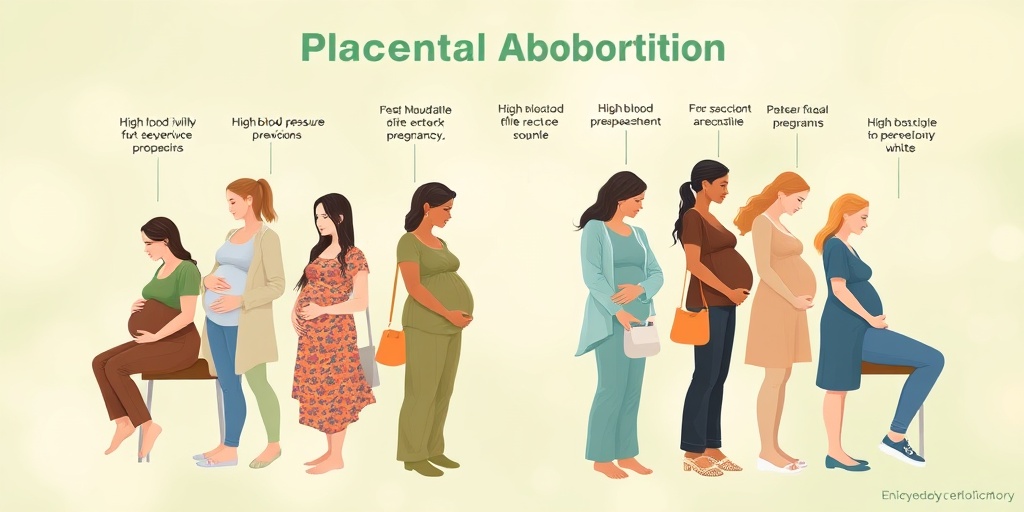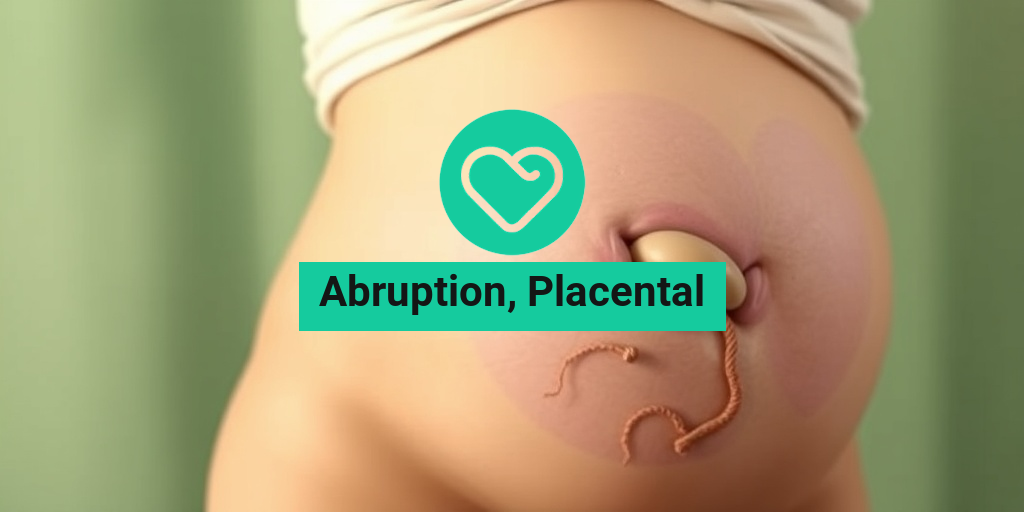What Is Placental Abruption?
Placental abruption is a serious pregnancy complication that occurs when the placenta detaches from the uterus before childbirth. This condition can lead to significant risks for both the mother and the baby, making it crucial for expectant mothers to understand its implications. The placenta plays a vital role in providing oxygen and nutrients to the developing fetus, so any disruption can have severe consequences.
Typically, placental abruption occurs in the third trimester, but it can happen earlier in the pregnancy as well. The exact cause of this condition is often unclear, but several factors may increase the risk, including:
- Previous history of placental abruption
- High blood pressure or preeclampsia
- Trauma or injury to the abdomen
- Smoking or substance abuse
- Multiple pregnancies (twins or more)
Understanding the meaning of placental abruption is essential for recognizing its potential dangers. If the placenta separates too early, it can lead to complications such as fetal distress, premature birth, or even stillbirth. Therefore, early detection and management are critical.
Placental Abruption Symptoms
Recognizing the symptoms of placental abruption is vital for timely intervention. The signs can vary in severity, but some common symptoms include:
- Vaginal bleeding: This is often the most noticeable symptom. The bleeding can be light or heavy and may be accompanied by clots.
- Abdominal pain: Women may experience sudden, severe abdominal pain that can feel like cramping or sharp discomfort.
- Back pain: Persistent or severe back pain can also indicate placental abruption.
- Uterine contractions: Frequent contractions or a hardening of the uterus may occur.
- Fetal movement changes: A noticeable decrease in the baby’s movements can be a warning sign.
If you experience any of these symptoms, it is crucial to seek medical attention immediately. Early diagnosis through methods such as a placental abruption ultrasound can help healthcare providers assess the situation and determine the best course of action.
In some cases, placental abruption can occur without any noticeable symptoms, making regular prenatal check-ups essential. Healthcare providers can monitor the health of both the mother and the baby, ensuring that any potential issues are addressed promptly.
For those concerned about placental abruption, resources like Yesil Health AI can provide evidence-based health answers and guidance. Understanding your body and being aware of the signs can empower you to take control of your health during pregnancy.
In conclusion, placental abruption is a serious condition that requires immediate attention. By being aware of the symptoms and seeking prompt medical care, expectant mothers can help ensure the best possible outcomes for themselves and their babies. Remember, knowledge is power, especially when it comes to your health! 🌼

Causes of Placental Abruption
Placental abruption, a serious pregnancy complication, occurs when the placenta detaches from the uterus before delivery. Understanding the causes of placental abruption is crucial for expectant mothers and healthcare providers alike. While the exact cause is often unknown, several factors can contribute to this condition.
1. Trauma or Injury
One of the most common causes of placental abruption is trauma to the abdomen. This can occur due to:
- Car accidents 🚗
- Falls
- Physical abuse
Such injuries can lead to the premature separation of the placenta from the uterine wall, posing risks to both the mother and the baby.
2. High Blood Pressure
Women with chronic hypertension or pregnancy-induced hypertension (gestational hypertension) are at a higher risk for placental abruption. High blood pressure can affect the blood vessels in the placenta, leading to complications.
3. Smoking and Substance Abuse
Smoking during pregnancy is linked to various complications, including placental abruption. Additionally, the use of illicit drugs, such as cocaine, significantly increases the risk. These substances can constrict blood vessels and impair blood flow to the placenta.
4. Multiple Pregnancies
Carrying more than one baby (twins, triplets, etc.) can increase the likelihood of placental abruption. The added stress on the uterus and the increased size of the placenta can lead to complications.
5. Previous History of Abruption
Women who have experienced placental abruption in a previous pregnancy are at a higher risk of having it again. This history can be a significant factor in assessing risk during subsequent pregnancies.
6. Infections
Certain infections, particularly those affecting the uterus, can contribute to placental abruption. Infections can lead to inflammation and compromise the integrity of the placenta.
Risk Factors for Abruption
In addition to the causes, several risk factors for abruption can increase the likelihood of this condition occurring during pregnancy. Being aware of these factors can help in early detection and management.
1. Maternal Age
Women over the age of 35 are at a higher risk for placental abruption. As maternal age increases, the likelihood of complications during pregnancy also rises.
2. Previous Pregnancy Complications
Women who have had complications in previous pregnancies, such as placental abruption or preterm labor, may face increased risks in future pregnancies. This history should be discussed with healthcare providers for proper monitoring.
3. Uterine Abnormalities
Structural abnormalities of the uterus, such as fibroids or a septate uterus, can increase the risk of placental abruption. These conditions can affect how the placenta attaches and functions during pregnancy.
4. Poor Nutrition
A lack of proper nutrition during pregnancy can lead to complications, including placental abruption. Ensuring a balanced diet rich in essential vitamins and minerals is vital for both maternal and fetal health.
5. High Parity
Women who have had multiple pregnancies (high parity) may have an increased risk of placental abruption. Each subsequent pregnancy can carry its own set of risks and complications.
6. Coagulation Disorders
Women with blood clotting disorders may be at a higher risk for placental abruption. These conditions can affect blood flow and increase the likelihood of complications during pregnancy.
Understanding the causes and risk factors associated with placental abruption is essential for expectant mothers. Regular prenatal care and open communication with healthcare providers can help manage these risks effectively. If you experience any symptoms such as abdominal pain, vaginal bleeding, or contractions, it’s crucial to seek medical attention immediately. 🩺

Diagnosis of Placental Abruption
Diagnosing placental abruption is crucial for the health of both the mother and the baby. This condition occurs when the placenta detaches from the uterus before delivery, which can lead to serious complications. Early detection can significantly improve outcomes, so understanding the diagnostic process is essential.
Signs and Symptoms
The first step in diagnosing placental abruption is recognizing the signs and symptoms. Common indicators include:
- Vaginal bleeding: This can range from light spotting to heavy bleeding.
- Abdominal pain: Women may experience sudden, severe pain in the abdomen or lower back.
- Uterine contractions: Frequent contractions may occur, often accompanied by tenderness.
- Fetal distress: Changes in the baby’s heart rate may indicate complications.
Medical Evaluation
If a woman exhibits symptoms of placental abruption, a healthcare provider will conduct a thorough evaluation. This typically includes:
- Physical examination: The doctor will assess the mother’s abdomen and check for tenderness or contractions.
- Ultrasound: A placental abruption ultrasound can help visualize the placenta and determine if there is any detachment. However, it’s important to note that not all cases are detectable via ultrasound.
- Monitoring fetal heart rate: Continuous monitoring can help assess the baby’s well-being and detect any signs of distress.
Laboratory Tests
In some cases, additional tests may be necessary to confirm the diagnosis. These can include:
- Blood tests: To check for anemia or other complications related to bleeding.
- Coagulation studies: To assess the mother’s blood clotting ability, which can be affected by significant bleeding.
Timely diagnosis of placental abruption is vital. If you suspect you are experiencing symptoms, seek medical attention immediately. Early intervention can save lives! 🚑
Complications of Abruption
Placental abruption can lead to a range of complications for both the mother and the baby. Understanding these risks is essential for managing the condition effectively.
Maternal Complications
For the mother, complications can include:
- Severe blood loss: This can lead to hypovolemic shock, a life-threatening condition.
- Infection: The risk of infection increases, especially if there is significant bleeding.
- Uterine rupture: In severe cases, the uterus may rupture, requiring emergency surgery.
- Future pregnancy complications: Women who experience placental abruption may face increased risks in future pregnancies.
Fetal Complications
The baby is also at risk of several complications, including:
- Preterm birth: Abruption often necessitates early delivery, which can lead to preterm birth complications.
- Low birth weight: Babies born from pregnancies complicated by abruption may have lower birth weights.
- Fetal distress: Reduced blood flow and oxygen can lead to distress, impacting the baby’s health.
- Stillbirth: In severe cases, placental abruption can result in stillbirth, making early diagnosis and management critical.
Long-Term Effects
Both mothers and babies may experience long-term effects from placental abruption. For mothers, the emotional toll can be significant, leading to anxiety or depression following a traumatic birth experience. For babies, potential long-term effects can include developmental delays or health issues related to being born prematurely.
Understanding the complications associated with placental abruption is essential for managing the condition and ensuring the best possible outcomes for both mother and child. If you have concerns about placental abruption, consult with your healthcare provider for personalized advice and support. 💖

Treatment Options for Abruption
Placental abruption, or abruption placental, is a serious condition that occurs when the placenta detaches from the uterus before delivery. This can lead to significant complications for both the mother and the baby. Understanding the treatment options available is crucial for managing this condition effectively.
Immediate Medical Attention
If a placental abruption is suspected, it is essential to seek immediate medical attention. Symptoms may include sudden abdominal pain, vaginal bleeding, and contractions. Upon arrival at the hospital, healthcare providers will conduct a thorough assessment, which may include:
- Ultrasound: This imaging technique helps determine the extent of the abruption and the health of the fetus.
- Monitoring: Continuous monitoring of the mother and baby’s vital signs is crucial to assess any distress.
Types of Treatment
The treatment for placental abruption largely depends on the severity of the condition, the gestational age of the fetus, and the overall health of the mother. Here are the primary treatment options:
- Observation: In cases of mild abruption, where the mother and baby are stable, doctors may recommend close monitoring. This could involve hospitalization for observation.
- Medications: Pain relief medications may be administered to manage discomfort. Additionally, corticosteroids may be given to help mature the baby’s lungs if early delivery is anticipated.
- Delivery: If the abruption is severe or if the mother or baby shows signs of distress, an early delivery may be necessary. This can be done via vaginal delivery or cesarean section, depending on the situation.
Post-Treatment Care
After treatment for placental abruption, follow-up care is essential. This may include:
- Monitoring Recovery: Regular check-ups to ensure the mother is healing properly and to monitor the baby’s development.
- Emotional Support: Experiencing a placental abruption can be traumatic. Counseling or support groups may be beneficial for emotional recovery.
Preventing Placental Abruption
While not all cases of placental abruption can be prevented, certain measures can reduce the risk. Understanding these preventive strategies is vital for expectant mothers.
Healthy Lifestyle Choices
Maintaining a healthy lifestyle during pregnancy can significantly impact the risk of placental abruption. Here are some tips:
- Avoid Smoking: Smoking during pregnancy is a known risk factor for placental abruption. Quitting smoking can greatly improve outcomes for both mother and baby.
- Manage Chronic Conditions: Conditions such as high blood pressure and diabetes should be well-managed with the help of healthcare providers.
- Stay Hydrated: Proper hydration is essential for overall health and can help prevent complications during pregnancy.
Regular Prenatal Care
Consistent prenatal visits are crucial for monitoring the health of both the mother and the fetus. During these visits, healthcare providers can:
- Screen for Risk Factors: Identifying and addressing risk factors early can help prevent complications.
- Provide Guidance: Expectant mothers can receive personalized advice on lifestyle changes and interventions to reduce risks.
Avoiding Trauma
Physical trauma can increase the risk of placental abruption. To minimize this risk:
- Wear Seatbelts: Always wear a seatbelt while driving or riding in a vehicle.
- Be Cautious with Activities: Avoid high-impact sports or activities that could lead to falls or abdominal trauma.
By understanding the treatment options and preventive measures for placental abruption, expectant mothers can take proactive steps to safeguard their health and that of their baby. Remember, always consult with a healthcare provider for personalized advice and care. 🩺👶

Frequently Asked Questions about Abruption, Placental
What is placental abruption?
Placental abruption is a serious condition during pregnancy where the placenta detaches from the uterus before delivery. This can lead to complications for both the mother and the baby.
What are the types of placental abruption?
There are generally two types of placental abruption:
- Partial abruption: Only a portion of the placenta detaches.
- Complete abruption: The entire placenta separates from the uterine wall.
Can placental abruption occur before 20 weeks of pregnancy?
Yes, placental abruption can occur before 20 weeks, although it is less common. Early detachment can pose significant risks to both the mother and the fetus.
What are the symptoms of placental abruption?
Common symptoms include:
- Sudden abdominal pain
- Vaginal bleeding
- Back pain
- Uterine contractions
How is placental abruption diagnosed?
Diagnosis typically involves a physical examination, ultrasound, and monitoring of the mother’s and baby’s vital signs. An ultrasound can help assess the condition of the placenta.
What treatments are available for placental abruption?
Treatment options depend on the severity of the abruption and the gestational age of the baby. They may include:
- Monitoring in a hospital setting
- Medications to manage pain and contractions
- Early delivery if the situation is critical
What are the risks associated with placental abruption?
Risks include:
- Preterm birth
- Low birth weight
- Increased risk of cesarean delivery
- Potential complications for the mother, including hemorrhage
Can placental abruption lead to maternal death?
While rare, severe cases of placental abruption can lead to serious complications, including maternal death. Prompt medical attention is crucial to manage the condition effectively.
What is the ICD-10 code for placental abruption?
The ICD-10 code for placental abruption is O45. This code is used for medical billing and documentation purposes.
How does placental abruption affect labor?
Placental abruption can complicate labor, potentially leading to an emergency cesarean section if the mother or baby shows signs of distress.
What should I do if I suspect placental abruption?
If you experience symptoms such as severe abdominal pain or vaginal bleeding during pregnancy, seek medical attention immediately. Early intervention is key to ensuring the safety of both mother and baby. 🚑




